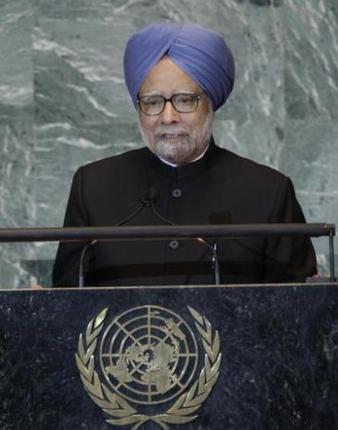
In his address to the UN General Assembly, he virtually rejected Pakistan Prime Minister Nawaz Sharif's demand for resolution of the Kashmir issue on the basis of UN Security Council resolutions, saying India favoured settlement of all issues on the basis of the Simla Agreement.
Yesterday, Sharif had made the demand when he raked up the Kashmir issue in his speech.
"India is committed sincerely in resolving all issues with Pakistan, including the issue of Jammu and Kashmir, through bilateral dialogue on the basis of Simla Agreement," he said. India considers the UN resolutions as outdated.
Singh said terrorism remained a grave threat to security and stability everywhere and extracts a heavy toll of innocent lives around the world.
"From Africa to Asia, we have seen several manifestations of this menace in the last few days alone," he said in an apparent reference to the twin terror attacks near Jammu on Thursday that claimed 10 lives and the Kenyan mall attack.
"State-sponsored cross-border terrorism is of particular concern to India, also on account of the fact that the epicentre of terrorism in our region is located in our neighbourhood in Pakistan."
While expressing readiness to solve issues including Jammu and Kashmir through bilateral dialogue, the Prime Minister said, "However, for progress to be made, it is imperative that the territory of Pakistan and the areas under its control are not utilised for aiding and abetting terrorism directed against India.
"It is equally important that the terrorist machinery that draws its sustenance from Pakistan be shut down. There must be a clear understanding of the fact that Jammu and Kashmir is integral part of India and that there can never, ever, be a compromise with the unity and territorial integrity of India."
Singh, who arrived here last night from Washington, will hold his first one-on-one meeting with Sharif since the latter assumed office in June.
The India-Pakistan dialogue process was put on hold after an Indian soldier was beheaded on the Line of Control (LoC) in January. Ties hit a new low when five more soldiers were killed by Pakistani troops along the LoC last month.
The terror attacks near Jammu virtually threatened to derail the New York meeting, with main opposition BJP demanding that Singh call off his meeting with Sharif.
But Singh decided to go ahead with the meeting, saying such attacks will not succeed in derailing the dialogue process.
Expectations from the high-profile meeting will be toned down, as the Prime Minister himself put it in the media briefing after his talks with President Barack Obama, "given the terror arm which is still active in our subcontinent".






Comments
Add new comment